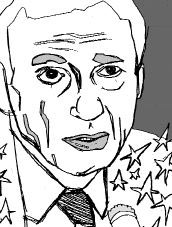THE FAITHFUL still believe. But does anyone else care?
Ralph Nader came through town last week, hawking his new book on his 2000 presidential run and, well, being Ralph Nader. After a career of activism and consumer advocacy so lengthy that most of his greatest accomplishments are taken for granted—and no longer associated with him—Nader can earn his money and fame simply by being himself.
That is very different, however, from inspiring a burgeoning new political movement, which is what Nader wants to do. To his fans—the progressive and Green Party faithful for whom Nader’s KeyArena rally only 15 months ago was a historic moment—there is no doubt: He’s still The Man.
But in the real world of politics, relevance can be fleeting. (Ask Al Gore.) It’s an odd time to be Ralph Nader. He’s the one man in America who has for the last 40 years most consistently warned about corporate depredations and their impact on our political system. Now we have the most putrid example of it—Enron—to come along in ages. And its stench attaches to both major parties, just like Ralph said. But lots of people out beyond the adoring front row still hate Nader for having handed George Bush the White House.
Nader doubtless hears this charge about every four minutes, and there’s an internal logic to his response. For the Democratic Party, it’s never a “good” time to leave. Like clockwork, every election it tells its progressive base: “Sure, we’re not perfect, but the other guys are so much worse that THIS IS NO TIME TO LEAVE.” And, Nader adds puckishly, his new voters just as arguably put Maria Cantwell over the top in Washington state, which now gives the Democrats control of the U.S. Senate. It cuts both ways.
All of this, however, defines Nader’s importance only by his impact on important people. Nader defends his campaign as being defined by the needs of the Greens, not the Democrats, whom he has given up on. But how delusional is the conceit that he is helping to build a viable third party? This is where Nader and his critics truly part ways. He, and the Green Party faithful, takes it as a truism; the rest of us see “Green Party” now and think “2 percent,” after Nader’s disappointing showing in 2000.
Greens like to think that Nader’s votes were a legitimate measure of interest in the Green Party, rather than a reflection of Nader’s own reputation. That’s dubious; plenty of people still think the Green Party without Nader is like the Rainbow Party without Jesse Jackson or the Reform Party without Ross Perot—a shell of disaffected activists, not players in any real sense.
The campaign’s real contribution was supposed to be that the energy from Nader’s run would not only attach itself to the Greens but would be poured into local party organizing for the future. Here, the record is decidedly mixed. The national Nader campaign and local party organizers did not work well together in 2000. In Seattle, one of the Green Party’s strongest candidates nationally, Joe Szwaja (who wound up pulling a respectable 20 percent against Congressman Jim McDermott), got only five minutes of pass-the-mike time during the KeyArena rally, while nonpartisan City Council member Peter Steinbrueck rambled on for 20. Only recently has Nader himself gotten out and hit the road, and by now much of the momentum from 2000 is long gone, and the political climate has shifted.
In 2004, whomever the Democrats anoint will surely play the we-can’t-afford-more-Dubya card. Two years is a long time, but at the moment, the Greens’ 2004 presidential campaign prospects look grim; the hope is at the local level. There, all those names Nader collected haven’t translated into anything yet. Most of the officeholders the Greens use to tout their progress are in a handful of smaller cities and campus towns and are for offices like Cemetery Commissioner and Animal Control Board.
It’s a start, but it’s not yet the quantum leap to legitimacy Nader promised. Locally, for every quality candidate like Szwaja (a former Madison, Wis., city councilman who now teaches at Nova High School), there are embarrassments like the Green Party of Seattle’s endorsement of a loosely hinged novice, Christal Wood, as a write-in mayoral candidate in last fall’s primary election. In the end, it is these contradictions that people will associate with the Green Party—not Ralph Nader.
Ralph was right all along about the corporations. But even without his poor vote total and the stigma of having helped Bush, he is too much his own institution to build someone else’s. The credibility of the Greens is best built precinct by precinct, not at book readings or basketball arenas. There has been some progress, but there’s a long way to go. And relevance in politics can be fleeting. Just because we need a viable third party, doesn’t mean we’ll get one.







